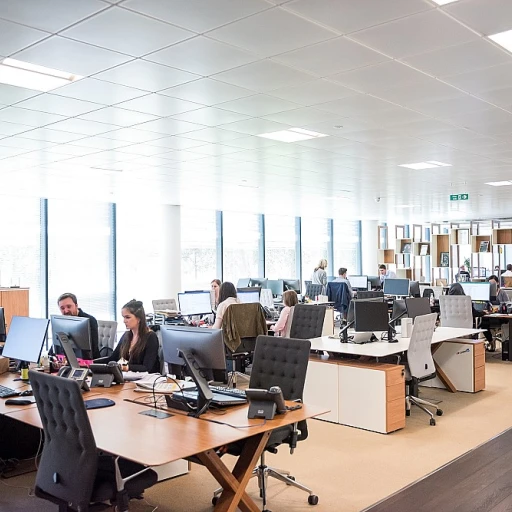Understanding the Skills Gap in Education
Navigating the Educational Landscape
The skills gap in education presents a pressing challenge for aspiring educators, especially in vibrant, complex regions like the District of Columbia. This gap often manifests as a mismatch between the skills teachers possess and the competencies needed in schools today. Understanding this gap is essential for those on the path to a teaching career in Washington. A significant aspect contributing to the skills gap is the rapid evolution of teaching requirements. As educational needs evolve, so must teacher preparation programs and certification processes. In Washington, aspiring teachers must demonstrate proficient command over various teaching strategies and adapt to modern educational demands, encompassing both traditional and innovative teaching methods.The Impact of Education Levels
A bachelor's degree has long been the minimum requirement for entering the teaching profession. However, holding a bachelor degree alone may not suffice to prepare educators fully for the challenges ahead. The gap is often wider in areas requiring special educational approaches or within the public schools sector, where demands are unique and multifaceted. Educator preparation programs are instrumental in addressing these gaps. They are designed to not only equip teachers with foundational knowledge but also provide insights into the nuanced aspects of education in District Columbia. Opting for a complete, approved educator preparation program ensures that future teachers have the proper skills needed for teacher certification in Washington.Certification and Licensure Considerations
To obtain a teaching license in Washington, candidates must meet specific state licensure requirements, which include passing widely recognized assessments such as the Praxis exams. These certifications ensure educators are adequately prepared to meet district expectations and contribute effectively to school communities. Aspiring teachers must also consider additional certifications, especially those interested in special education or other specialized teaching areas. Such certifications help bridge the skills gap by focusing on essential competencies that meet diverse student needs. Navigating the path to teacher certification involves a comprehensive understanding of these dynamics. By recognizing the skills gap as an area needing targeted strategies, educators can pursue relevant degree programs and certifications that enhance their readiness to contribute meaningfully to the educational landscape. For more insights on how to equip oneself through programs like Carnegie's insights on public speaking, which can enhance teaching skills, visit this resource.The Path to DC Teacher Certification
Steps to Becoming a Certified Teacher in Washington, DC
Embarking on the journey to become a certified teacher in Washington, DC requires a clear understanding of the necessary steps and requirements. This process is designed to ensure that educators are well-prepared to meet the diverse needs of students in public schools. Here's a guide to help you navigate this path:
- Hold a Bachelor’s Degree: The first step is to obtain a bachelor degree from an accredited university. This is a prerequisite for entering any teacher preparation program.
- Complete an Approved Educator Preparation Program: Aspiring teachers must enroll in and complete an approved educator preparation program. These programs are tailored to equip future educators with the skills needed for effective teaching, including special education if desired.
- Pass Required Exams: Candidates are required to pass the Praxis exams, which assess subject-specific content knowledge and teaching skills. Successfully passing these exams is crucial for obtaining a teaching license.
- Apply for Licensure: Once the educational and examination requirements are met, candidates can apply for a teaching license through the District of Columbia’s Office of the State Superintendent of Education. This includes submitting all necessary documentation and fees.
- Consider Additional Certifications: For those interested in specialized fields, such as special education, additional certifications may be pursued to enhance qualifications and job prospects.
Understanding these steps is essential for those looking to contribute to the educational landscape in DC. For more detailed guidance on certification processes, you can explore resources like navigating the path to certification in various fields.
Bridging the Skills Gap: Strategies for Aspiring Teachers
Effective Strategies for Aspiring Teachers in Bridging the Skills Gap
Aspiring educators aiming to fill the void in education must equip themselves with comprehensive strategies and credentials that match the demands of teaching. It's not just about obtaining a teaching license or certification; it's about ensuring these qualifications align with the educational needs of District Columbia's schools. Before pursuing a teaching career in Washington, completing an approved educator preparation program is essential. These programs are specifically designed to prepare prospective teachers for the dynamic environment of public schools. Whether you're considering a bachelor degree or master degree, your path must incorporate hands-on experiences and theoretical knowledge. Consider these essential steps to successfully bridge the skills gap as an educator:- Select the Right Program: Explore accredited universities and institutions offering programs approved by the state. These programs ensure that you receive the necessary training to qualify for a teaching license.
- Student Teaching Experience: Engage in student teaching or substitute teaching to gain practical experience. Such exposure is critical for understanding classroom dynamics and applying learned theories effectively.
- Additional Endorsements: In fields like special education, obtaining additional endorsements can enhance your qualifications and meet specific educational demands in Washington.
- PassRelevant Exams: Successfully pass exams such as the Praxis, as they are essential for teacher certification in Washington. Demonstrating proficiency in your subject area is crucial.
Role of Educational Institutions in Closing the Gap
The Role of Institutions in Skill Development for Educators
Educational institutions play a crucial role in equipping aspiring teachers with the necessary competencies to meet the demands of the modern teaching environment. In District Columbia, universities and colleges offer a variety of programs designed to prepare individuals for successful careers as educators.
Bachelor and master degree programs form the foundation of this preparation. Offering degrees in education and specialization in areas such as special education, these institutions ensure that the candidates are adequately trained. Teacher preparation is further enhanced through comprehensive educator preparation programs, which are essential for those pursuing teacher certification.
Institutions often collaborate with public schools to provide practical experience. This initiative allows educator preparation programs to be more aligned with the real-world demands faced by teachers in the classroom. Prospective teachers gain valuable insights and develop teaching strategies that are pivotal for their success in schools, including those within the state of Washington.
For many aspiring teachers, obtaining certification in Washington involves completing an approved educator program. These programs are meticulously designed to cover the key competencies required for a teaching license. Additionally, they prepare candidates to excel in licensure exams such as the Praxis, a significant step for those who hold a bachelor's degree and seek to become licensed teachers in the region.
Another essential aspect where institutions contribute is by offering substitute teacher programs. These programs provide flexibility for individuals who wish to enter the teaching field without immediately pursuing full licensure. Furthermore, approved programs are available to help educators enhance their skills, request info about additional courses, or transition into different teaching specializations, ensuring a well-rounded preparation.
Ultimately, universities and colleges, through rigorous teacher preparation and certification processes, are key to maintaining a robust education system. By consistently updating their curriculum and forging strong partnerships with public schools, these institutions bridge the skills gap and produce educators who are ready to contribute effectively to the educational landscape in Washington and beyond.








